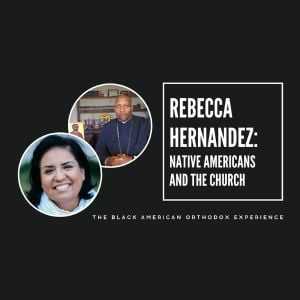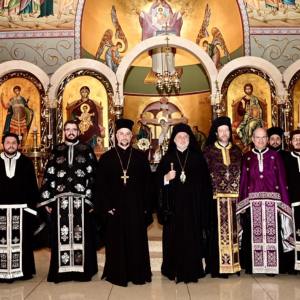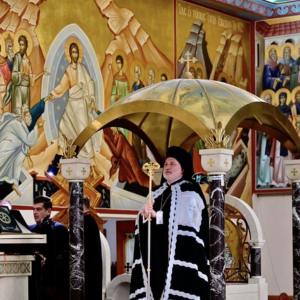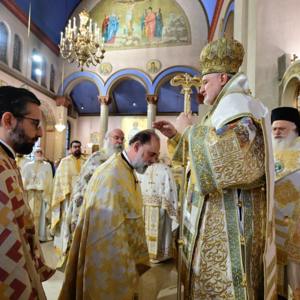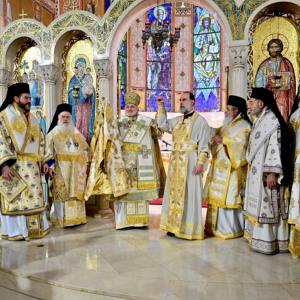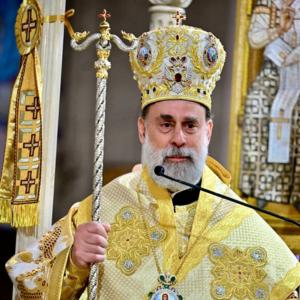His Eminence Archbishop Elpidophoros of America
Homily for the Saturday of Lazarus
Saints Catherine and George Greek Orthodox Church
Astoria, New York
April 25, 2021
Λόγῳ σου Λόγε τοῦ Θεοῦ, Λάζαρος νῦν ἐξάλλεται, πρὸς βίον παλινδρομήσας…
O Word of God, by your word Lazarus now leaps forth, taking up again the path to life…[*]
Indeed, my beloved Christians, today the Lord Jesus Christ reveals His complete identity as the Lord of the living and the dead, when He calls forth Lazarus from his four-day tomb.
He calls for His friend, whom He left to bring His disciples to faith.[†]
He calls for His companion, as He grieves with the sisters of Lazarus, and whose tears bring the Lord to weeping.[‡]
And He calls for us all: we, who are dead in our sins; we, who are trapped in self-made tombs of self-pity and self-obsession; we, who have shut up our hearts and minds through anger, resentment, envy and the lack of love.
The word of the Word calls to us all.
He calls because He is the Lord of the living and the dead, and He will come again to judge the living and the dead – πάλιν ἐρχόμενον μετὰ δόξης κρίναι ζῶντας καὶ νεκρούς – as we affirm every time we recite the Creed.
Shortly before His Passion, the Lord appeared on Mount Tabor with the two great Prophets of the Old Covenant – Moses, who was buried by God Himself,[§] and Elias, who was taken up alive into heaven.[**]
In the midst of these two living beings, the Lord Jesus Christ spoke of His own “Exodus” that He was going to fulfill in Jerusalem. [††] This “exodus” was His passing over from death – for our sakes – unto life, and liberating all those in the grave. Before the miracle of the raising of Lazarus, the Lord was revealed in His Transfiguration on Tabor as the Master of life and death.
And at the tomb of Lazarus, He exercised that authority in view of everyone. For Lazarus was dead for four days. His soul had passed beyond his body. He had traveled to Hadës, which is called “Sheol” in Judaism, and described in the Psalms of David as the place where one is “forgotten, cut off, laid in the lowest pit, in darkness, and the shadow of death.” [‡‡]
Lazarus was four days dead! One more day than the Lord spent in the tomb, to show that he was dead beyond doubt. He was even beginning to reek with the stench of death. And his sisters, Martha and Mary, had fallen far beyond hope into the depths of grief, despair and mourning.
And in the moment of their deepest sorrow, the saintly Martha and Mary expressed their frustration and remorse to the Lord – Martha said:
“Lord, if you had been here, my brother would not have died.” [§§]
And Mary said:
“Lord, if you had been here, my brother would not be dead.” [***]
Their sisterly heartache presses on the Lord, until we read:
When Jesus saw Mary weeping, and the Judeans who had accompanied her wailing with grief, he shuddered in His spirit, and was shaken deep within. [†††]
Saint John Chrysostom says that although Jesus weeps as man, He raises Lazarus as God. [‡‡‡] But it is all the human interaction – the words, the tears, the emotions that are pouring forth from His friends and are encircling the Lord – that bring Him to face the Tomb of Lazarus. And there, the incarnate Word of God calls him back from the dead by the words:
Λάζαρε, δεῦρο ἔξω!
Lazaros, come forth! [§§§]
The Lord Jesus Christ called His friend back from the dead by speaking with authority and with full emotion.
My beloved brothers and sisters in Christ:
As we prepare to traverse this Holy Week, let us listen deeply when we are in Church and attend the services. Let us listen for the Voice of the Lord to speak to us, whether softly or loudly.
Our God understands the situation of each and every one of us – of our families and our friends, as well as whatever there is in our life that is imprisoned by fear, anger or envy. He fully understand whatever there is within us that deadens our soul and keeps us trapped in selfishness.
The Lord, through His words, is calling out our name, just as He did to Lazarus, in order to set us free.
For in this Holy Week, the Lord wills to die; He wills to enter a tomb to free us all from death and the tomb. And, indeed, the tomb has become for Him a new womb of everlasting life.
Listen, then, for His voice this week. Quiet your hearts and minds, and come to the Church, where you hear the echoes of His Message of love and truth.
I pray that this Holy Week, and this Holy Pascha, will be for you a liberation from sin and sorrow, which will place you again on the path of eternal life.
Καλή Δύναμη, καὶ Καλή Ἀνάσταση!
[*] Exapostilarion of Lazaros Saturday Matins.
[†] Cf. John 11:13.
[‡] Cf. John 11:3-35.
[§] Cf. Deuteronomy 34:5-6.
[**] Cf. II Kings 2:11.
[††] Cf. Luke 9:30-31¨ Καὶ ἰδοὺ ἄνδρες δύο συνελάλουν αὐτῷ, οἵτινες ἦσαν Μωϋσῆς καὶ ̓Ηλίας, οἳ ὀφθέντες ἐν δόξῃ ἔλεγον τὴν ἔξοδον αὐτοῦ ἣν ἔμελλε πληροῦν ἐν ̔Ιερουσαλήμ.
[‡‡] Psalm 87:5-6 (LXX).
[§§] John 11:21.
[***] John 11:32.
[†††] John 11:33.
[‡‡‡] Homily 63 on the Gospel of John.
[§§§] John 11:43.



